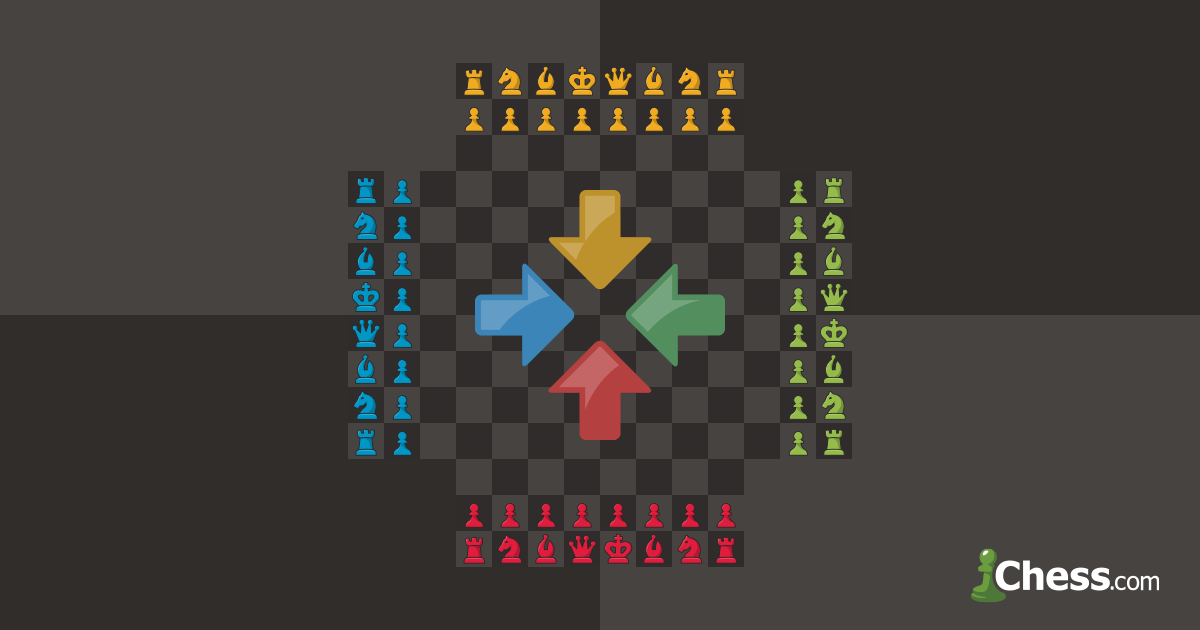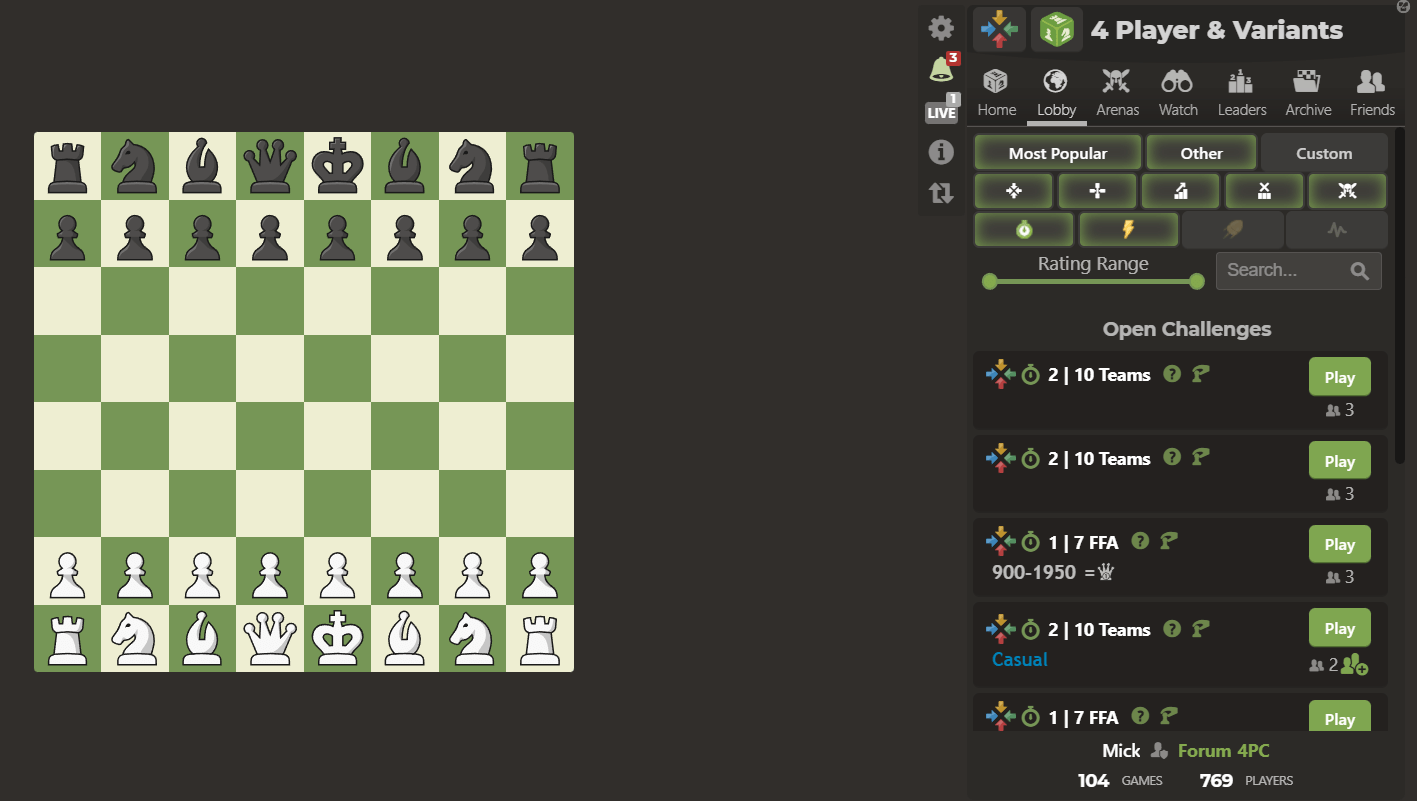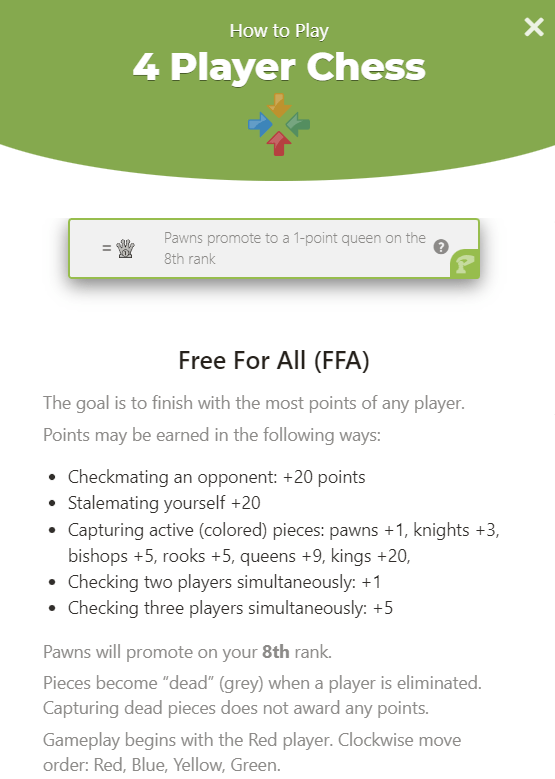
Club Of The Month: 4 Player Chess
This edition of Club of the Month celebrates one of the most unique clubs on Chess.com: 4 Player Chess. Devoted to one of the most interesting chess variants, the 4 Player Chess club has an active community of around 25,000 members who love the four-player version of the game.
We talked to Luke Romanko (also known as FourPlayerChess on Chess.com and Twitch), one of the administrators of the club, to find out what makes 4 Player Chess so special.

Chess.com: What inspired you to take a leadership role within your chess club?
Romanko: I was a highly active player since October 20, 2017. When I saw how cool it was to spot tactics in this kind of game, and noticed that even the greatest regular chess players in the world were susceptible to missing and/or falling for these kind of tactics, I saw that this could potentially be anyone’s game to be a winner!
Soon after I joined the club, I became active in the forums, posting some of the first-ever 4PC puzzles and discussing 4PC theory. I was a volunteer administrator for this club and the server since August 29, 2018. I wanted to see the best of the best play against each other and get the highest-quality games, so I organized the World 4 Player Chess Championship.
A disclaimer to some of the common misconceptions out there: I am not the creator! I am just a volunteer administrator, as are many 4PC/variants club and server administrators, and I'm not a Chess.com developer/staff member.
What makes 4 Player Chess so compelling?
In 4 Player Chess (also known as 4PC), tactical ideas from regular chess are more common and make the game exciting while still maintaining two-player chess principles when it comes to certain aspects of the game, for example, in endgames.
4PC has an increased element of luck compared to “regular” chess, which also makes it more accessible/attractive to lower-rated players.
For those who love regular chess, 4PC may be TWICE the fun!
Aside from the obvious addition of two extra players, what are the key differences between regular chess and 4 Player Chess?
The most significant change in 4PC is that the board is expanded from 64 to 160 squares. If you love bishop pairs in regular chess, this will make your 4PC experience very exciting! This change causes your queens and bishops to have a lot more room to maneuver around, while the knights are typically used to either defend your position or get an attack on your opponents along the edge of the board.
Rooks are quite similar to regular chess, since they are great for endgames but usually stay in the back during the early phases of the game.
Tactics play a large role in 4PC. 4PC is all about finding tricky attacks and exploiting weaknesses in your opponent’s position. All the tactics you know and love from regular chess and puzzles also work in 4PC, with the addition of some new tactical ideas.
How is the strategy different? Are there any chess skills or tactics that are especially useful?
Due to the addition of two other players, you also get to calculate move orders. In one move, all four players have their turns one after another going clockwise around the board. This allows discovered attacks to be created or executed without the attacked player being able to react to it immediately.
This allows for a new tactical idea: the king capture. While checkmates are still a thing that either end the game in Teams (two opposite players are on a Team) or remove a player from the game in Free For All (everyone playing for themselves, also known as FFA), king captures can occur when one player opens another player’s piece to attack the king of a third player. As complicated as this might sound at first, it’s actually really simple when you get used to it.
Also, with two extra players, the game allows an imbalance between attacking and defending players. While regular chess is always a 1 versus 1 situation, in 4PC you can encounter possible attacks that boil down to a 2v1 or sometimes even a 3v1 in FFA! Defending in these situations is incredibly challenging and sometimes even impossible, so you have to be careful and calculate these in advance.

As for general strategies, regular chess and 4PC are quite different, and even within 4PC you have to differentiate between Teams and FFA strategies.
Teams:
New players in regular chess typically get advice like “Don’t move your queen out early!” or “Get your king to safety by castling!”. In 4PC it is usually the other way around. Queens are incredibly good attacking pieces and have more than enough space in the middle of the board to not be harassed by minor pieces like they would in regular chess.
As for castling, it is usually recommended to avoid it. The reason is that your opponents are located to your side, and whenever you castle you will move your king closer to one player (making it easier for them to attack you) and further away from your own pieces (making it more difficult to defend).
Free For All (FFA):
In this format, you can win from almost ANY position, playing basically anything you want! In this game, an extra element is added: a scoreboard. Each enemy piece capture/situation achieved has an awarded value of points. If you are up by more than 20 points against only one other active player, you can hit the 'Claim Win' button immediately!
Because of this element, never resign! Since the goal is to have the most points (and at higher levels to avoid playing for second), players will ideally want to keep others from winning and that gives you a chance to promote your last two pawns or steal a game-winning checkmate on one of your opponents!

In general, however, it is suggested to play defensive and developing moves in the opening against most players. If an opponent blunders a piece or hangs a checkmate, and taking it doesn’t ruin your position, go for it!
Trading is not encouraged, even if it wins an extra piece or pawn against one player, because there are two other players still at the table who will have more material than you at the end of it. During the stage where one player is eliminated, finding the right opportunities to earn points and checkmate players is key—in some situations, you do not take a free piece or a checkmate if it gives one or more of your opponents too many chances to win the game.
Only in elite FFA games (2000+) will you see the need to possibly incorporate Teams theory into your openings. This is because the player across from you is geometrically your “best friend” in the four-player stage until one player is eliminated. Teaming is allowed as long as it's not communicated through chat or pre-arranged, and is a natural part of the game.
Standard FFA is the most popular variant on the variants server, and anyone can become a world champion at this variant!
What are some of the craziest or most interesting games you've seen in the club/in 4 Player Chess in general?
There are many intriguing games of 4PC being played. From a biased point of view, I’d say the craziest game ever played was when I partnered FM/WIM Anna-Maja Kazarian against a GM & FM duo.
I played a dubious opening on the first move and confused the opponents, playing the entire game down a bishop with activity as compensation. This was one of the most discussed 4PC games of all time and looked to be nearly deciding who would qualify during the third qualifier arena of the 2020 Teams World 4 Player Chess Championship.
This game earned the most votes on a poll for the “greatest game of 2020” during a Twitch stream that 5-time 4PC world champion Lars Johan Brodtkorb hosted.
What separates your chess club from other clubs?
The vast majority of our active members enjoy 4PC and variants either as much or more than regular chess. Our club now has over 24,500 members, specifically 4PC enthusiasts! This club is actively administrated by volunteers who love to organize events for the community.
Several times a year, these volunteers host or help with major 4PC collaborations, World 4PC Championships, and League events. Arenas are an ongoing feature, and we are happy to host 4PC arenas and organize 4PC games upon request!
We also really appreciate it when women come to try out this game. Recently, IM Anna Rudolf, FM Nemo Qiyu Zhou, WFM Anna Cramling, and WGM Dina Belenkaya were featured in some cool games with and against each other, and really enjoyed the collabs!
Does your club support scholastic chess?
Historically, we haven't specifically supported scholastic chess, but we'd love to. In the future, 4PC arenas may be created exclusively for those in school and the 4PC community would love to see scholastic-only tournaments be a feature on the 4PC server.
At the current moment, 4PC arenas can be created upon request and may be able to feature and highlight scholastic chess clubs specifically. We’d also love to hear when scholastic chess hosts over-the-board 4PC tournaments!
What Chess.com tools do your members use the most?
First and foremost, nearly all of them have been on the 4PC/variants server at least once. This is an obvious answer, but outside of 4PC, a lot of our members find the most benefit from Puzzles.
What advice would you give to clubs on Chess.com that are just starting out and would like to grow?
Be sure your club has a unique element to it! Find respectful ways to share the club and build rapport with others. Many people out there are desperate to get members and spam links to their club, and hardly anyone wants that. One thing that commonly helps people build their own personal clubs on Chess.com and adds credibility is having a Twitch stream associated with it!
How can Chess.com members get involved in your club?
Chess.com members can get involved in the club right away by contributing positively in the forums with unique feedback regarding 4PC. They can share 4PC content and 4PC events with administrators’ permission.
Lastly, do you have any advice for people who want to try 4 Player Chess for the first time? Are there any tips/resources you'd suggest?
Watch some of the top active games. Have a look through the archive of the best 4PC engines! YouTube/Twitch VODs are your friend. Catch LIVE streams when you see them! 4PC openings are very different from 2PC ones, so do watch a tutorial or two just to get used to things. Check out this guide, which will give you a quick rundown of the game.
New to teams? Look for a knowledgeable teammate! Top players are approachable and may even enjoy the rating boost benefits of playing with a new player ready to learn! In a matter of days or months, you may be able to achieve a rating you never thought possible!
Thanks to the 4 Player Chess team for providing us with their answers for this month's article.
If you'd like to nominate a Chess.com club for our next Club of the Month article, fill out the nomination form below:
Previous Clubs of the Month:






